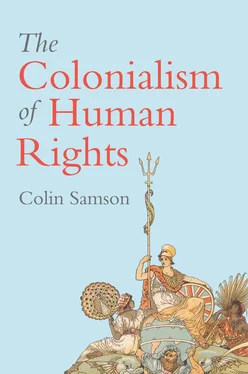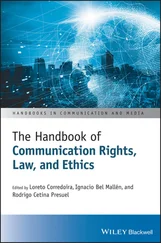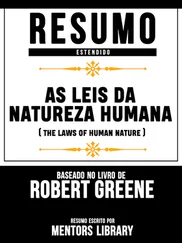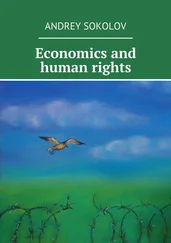The British government’s confusion over human rights is equally profound. In 2018, on the seventieth anniversary of the United Nations (UN) Universal Declaration on Human Rights (UDHR), UK Foreign Office minister Lord Ahmad of Wimbledon declared that ‘Britain is a global defender of human rights, fundamental freedoms, and democratic values, and has championed campaigns to end modern slavery and human trafficking, to prevent sexual violence in conflict, and to ensure at least 12 years of quality education for girls.’ 7A few months later, the International Court of Justice (ICJ) ruled that Britain had violated the human rights of approximately 2,000 residents of the Chagos Islands, whom it deported to Mauritius to lease out their lands to the US military in 1965. That same day, Lord Ahmad announced that the UK would be seeking re-election to the UN Human Rights Council (HRC) in view of, among other things, a ‘rising tide of impunity’ around the world. 8No reference was made to the ICJ ruling, and no apology to the Chagossians has been forthcoming. Indeed, the British government ignored the demand to end its colonial control over the islands as soon as possible, and when the UN General Assembly voted by a margin of 116–6 on a resolution for Britain to surrender the Chagos archipelago to Mauritius so that the Chagossians could return to their lands, the Foreign Office could only register its disappointment and underline that the US base on the Chagos Islands keeps the world safe from terrorism. 9Ensuring safety has meant that the islands were used, contrary to basic human rights standards enshrined in the UDHR and many other instruments, for secret renditions of terrorist suspects to detention camps or military ships there. 10Retaining control of the islands as a leased-out military colony further violated UN Resolution 1514 which prevented the breaking up of colonies before independence. Britain’s impunity co-exists with its enthusiasm for human rights.
Expressed in many ways today, 11human rights call for universal application through national and international institutions recognizing specific, sometimes ‘inalienable’, rights that accord to people either as individuals or as collectives. Broad rights to equality, liberty, freedom, legal protections and private property decreed in the Enlightenment, but having antecedents in Roman, Greek and early modern European thought, were believed to be fortified by the French and American Revolutionary declarations as well as nineteenth-century British liberalism. According to Lynn Hunt, these declarations ‘gave birth to an idea that would make slow and steady progress in Europe and the rest of the world during the nineteenth and twentieth centuries’. 12These rights were integrated into state constitutions, jurisprudence and other written laws, especially after the 1948 Declaration. Although most chroniclers of human rights rarely venture outside the European orbit, some argue that the sources of human rights can also be traced to declarations, activism and legal argument emanating from the Global South. 13However, these are not the product of epistemologically distinct indigenous cosmologies that might consider the issues at stake very differently, something I shall consider in chapter 6. Human rights were given international expression through the UDHR in 1948, the Geneva Convention in 1951, further UN Covenants and international jurisprudence in international and regional courts. These may be called human rights, but they are also civil rights, citizenship rights or just ‘rights’. Indeed, many of the great social movements placed all such rights under the same umbrella, and have called for equal and universal application.
Nevertheless, denial of human rights, and rationalizations of such denials based either in law or in exceptions to the law, often occur alongside assertions of virtues that are held to reside largely with, and derive from, Europe and its North American diaspora. This paradox – or, to use a harsh word, hypocrisy – is incarnated in the colonial dimensions of human rights pronunciations, and is a component of ongoing white privilege and asserted moral rectitude. A Janus-faced orientation to the world recalls European writers struggling with Empire, such as George Orwell. As an English person commenting on a world in which the British state and society had such profound influence, Orwell was exercised about the imperial subordination of others regarded as inferior. In Burmese Days , and essays such as ‘England Your England’, he illustrated how the British Empire was presented as a triumph of civilization, exposing contradictions between this and the numerous abominations committed in Britain’s name. 14
It is something of this that attaches to discussions of human rights. Rights which were rhetorically associated with Western civilization, and often held to be universally valid, were explicitly denied to colonial subjects, indigenous peoples and the enslaved. The denial of equal rights – or, sometimes, any rights – to these populations was justified by their imputed savagery, backwardness and inferiority. Indeed, the claim to be acting on behalf of humanity was a convenient justification for colonialism. General Mattis and Lord Ahmad of Wimbledon are emblematic of a longer history in which the practice and endorsement of non-universal human rights corresponds with claims to allegiance to universal human rights. This tension is now manifold, as the exceptions, exclusions and denials of human rights that occurred simultaneously with colonialism and enslavement metastasized into new realms of de facto non-universality.
Contemporary human rights conflicts are layered onto this uncompleted history of racial domination. Consequently, my focus is on past and ongoing practices of Western colonial powers and settler colonial states and their relevance to selectivity and differentiation in human rights today. My task is not to follow the footsteps of numerous human rights scholars who trace genealogies of international human rights, or to advocate a system of apolitical and fully universal human rights. This is not so much a study of human rights, but of uncompleted histories of exception, differentiation and rightlessness which cannot be entirely extricated from the study of human rights.
As I hope to show, the official treatment of particular populations is linked to colonial domination and its enduring social, political and economic expressions. Human rights recognition and implementation can be roughly mapped onto ongoing histories. Following Chantal Mouffe’s agonistic politics, 15we may say that Western colonial domination as a ‘social division’ is constitutive of a colonialism of human rights. States which administer human rights are represented by institutions and personnel that embraced ideas affirming the inferior status of indigenous and enslaved persons. Because states are dedicated to the perpetuation of hegemony, neither they nor the official human rights they oversee can hold great potential for social change.
Where I Am Coming From and What Follows …
I would like to think that Orwell’s spirit attaches in some small way to the following chapters linking human rights to colonialism. While what follows is not autobiographical or ethnographic, it is connected to my animation onto these pages. A large part of this emerges from experiences, both in my personal life and working with indigenous peoples, and in seeing at first hand the many futilities of claiming rights within alien systems of law that perpetually situate indigenous peoples as petitioners in inferior relationships to the state and other third parties. 16The book also emerges from my work as a teacher, and insight accrues from collaborations with students, texts and sources in university contexts. I have often asked myself whether there can be a dividing line where research somehow legitimates itself by crossing into being impersonal and devoid of the feelings that come from interacting with each other.
Читать дальше












